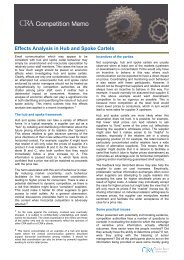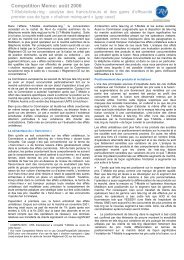CUSTOMER AGREED REMUNERATION - CRA International
CUSTOMER AGREED REMUNERATION - CRA International
CUSTOMER AGREED REMUNERATION - CRA International
You also want an ePaper? Increase the reach of your titles
YUMPU automatically turns print PDFs into web optimized ePapers that Google loves.
<strong>CUSTOMER</strong> <strong>AGREED</strong> <strong>REMUNERATION</strong><br />
• CAR will require advisers to explain their services and the degree to which these<br />
will be provided over time. This will reduce confusion regarding the role of trail<br />
commission and increase the quality of ongoing advice.<br />
However, introducing CAR will also result in substantial compliance costs for advisers<br />
and providers. It will require more flexible systems that allow different charges for<br />
advice to be applied and new disclosure to inform consumers of the consequences of<br />
their actions. In the short-term this requires system changes by providers but in the<br />
longer term it will impose costs on intermediaries due to increased time with clients<br />
and answering additional queries. At this stage it is only possible to give a broad<br />
estimate of these costs if CAR is applied to packaged investment products:<br />
• Providers: We estimate that the one-off costs for providers would be of the order<br />
of £60 million, assuming these are spread over five years this means a cost of<br />
£12 million a year. There would be additional ongoing costs for providers of<br />
around £5 million a year. The figures reflect the views of providers that CAR<br />
would impose minimal (if any) additional ongoing costs once one-off systems<br />
costs had been incurred. 2<br />
• Intermediaries: Assuming all of today’s IFAs adopt the CAR model, compliance<br />
costs would be of the order of magnitude of £10 million per annum.<br />
Overall the costs are estimated as £27 million per year. Potential benefits include £66<br />
million if all provider bias is removed as well as benefits that have not been quantified<br />
such as increased trust and demand for advice, increased competition and lower<br />
charges to consumers. On a Net Present Value basis, we estimate that CAR could<br />
deliver net benefits in excess of £150 million over the first five years. Further benefits<br />
that have not been included but that would be expected in the longer term include<br />
shopping around, increased demand from non-purchasers, reductions in product bias<br />
and improvements in the quality of ongoing advice. Thus even making cautious<br />
assumptions regarding the potential benefits from CAR, the benefits seem likely to<br />
outweigh the costs.<br />
Over what time period should CAR be introduced?<br />
The analysis undertaken for this project suggests that the benefits of CAR will grow as<br />
consumers, intermediaries and providers adjust to the new market environment. This<br />
is likely to take time and a realistic timescale should be set for both the introduction<br />
and assessment of the new regime.<br />
The analysis finds that CAR will bring benefits in terms of perception in the short-term<br />
but customers are only likely to use the increased freedom of CAR, through negotiation<br />
and shopping around, as their confidence grows. Given that these products are<br />
purchased infrequently, this confidence will take time to grow.<br />
2 It should be noted that we have not collected compliance cost information from investment fund managers.<br />
7




